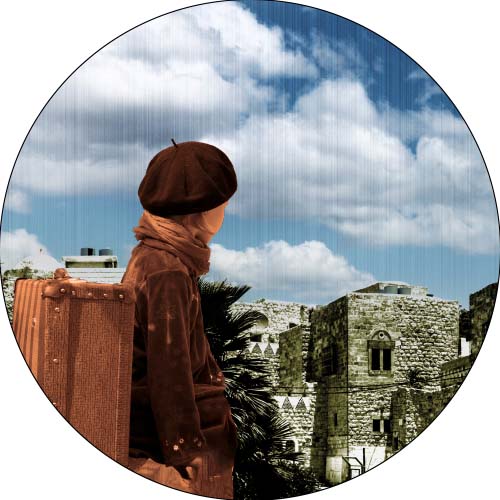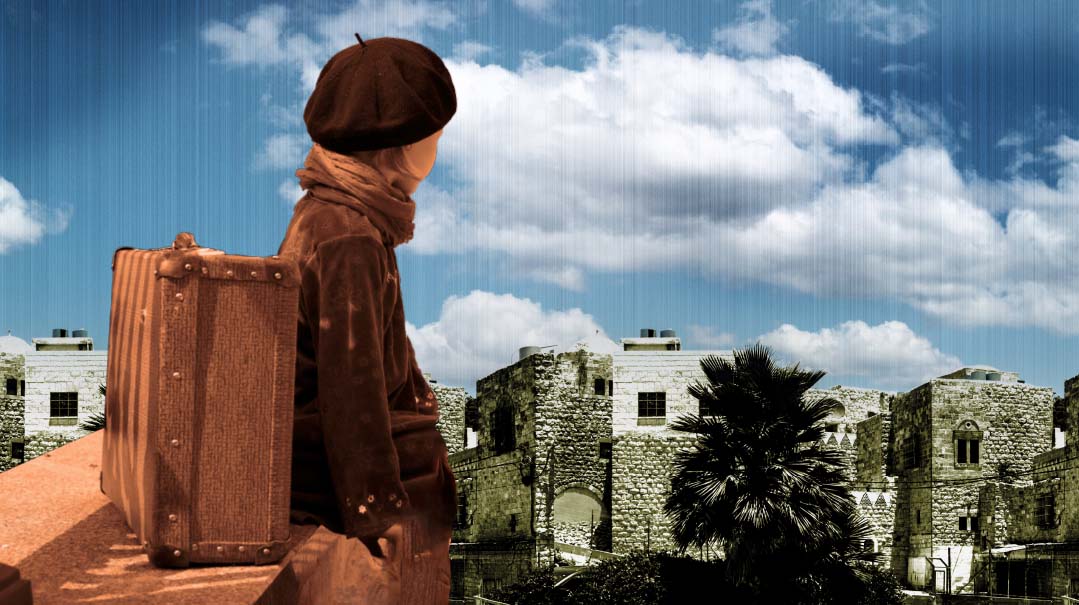Building Dreams: Chapter 38
| November 15, 2022“Is that all everyone knows me as? The granddaughter whose father was killed? The orphan?”

Elka
T
he walk to shul was cool and beautiful in the early morning. Even the busy streets were quiet, and we could hear our footsteps against the cobblestones. As the large building loomed ahead of us, Bubbe pulled me toward the women’s entrance and upstairs to the balcony. It was quiet and peaceful in shul, and I pulled out my siddur to daven. As I whispered each word, I wondered again how the people who lived here could daven when they barely understood what they were saying. But Bubbe had said she mostly understood the words, so maybe they did know more Hebrew than I thought they did.
“Gut Shabbos,” said a tall, thin woman to Bubbe when davening was over. “Is this your granddaughter?”
“Yes.” Bubbe smiled, giving my shoulder a squeeze. “Elka, this is Mrs. Abelson.” The woman bowed her head in acknowledgement of her name.
“This is the one from Eretz Yisrael? The one who—”
Bubbe nodded quickly and the woman broke off, but I knew what she was going to say. The one whose father was killed. So that’s how everyone thought of me. I’d thought if I came here, I’d be able to get away from that. Get to just be me. Elka. Apparently the legacy left to me by my Arab neighbors in Chevron had followed me all the way to Riga.
A quick peek at my face was all it took for Bubbe to realize that I had understood what hadn’t been said. “Gut Shabbos,” she said to Mrs. Abelson, ending their conversation. She steered me quickly out of shul.
The walk home was quiet. Silently, we made our way up the stairs and into Bubbe’s apartment. When we opened the door, we smelled the deep smell of cholent simmering. Silently, we moved to the dining room to set the table.
“Here, Elka,” Bubbe said, handing me a stack of fine china dishes. Three big plates, three small; there were to be no guests at the Shabbos seudah today.
“Bubbe?” I finally said as I put out the silverware.
“Hmm?”
“Is that all everyone knows me as? The granddaughter whose father was killed? The orphan?”
Bubbe put down the bowl she was holding and turned to face me. “Elka,” she said, “now you have the chance to change that. Now they’ll get to know you and you’ll just be Elka.” And she picked up the bowl and went to fill it in the kitchen.
The seudah was beautiful. Afterward, Bubbe said, “I want to take you to visit a friend now. We’ve been friends for years and they have a girl around your age that I think you might enjoy getting to know.”
“Chava Mendelwitz?”
Bubbe looked at me, surprised.
“You mentioned her name to Tante Perel yesterday,” I explained.
“Oh.” Bubbe nodded. “Come,” she said, “they live nearby.”
“Why are we going to visit them?” I asked Bubbe as we fell into step on the sidewalk, walking towards Bubbe’s friend’s house.
“I thought it might be nice for you to spend some time with a girl your own age,” Bubbe explained shortly. “But you should just know before we go — Chava is not their daughter. She is their niece.”
I waited for Bubbe to go on, but she didn’t explain and I didn’t ask. I wanted to. I was so curious. But if Bubbe wasn’t explaining, she obviously had a reason.
Chava turned out to be closer to 13 than 11. She took me to her room and we sat on her bed quietly for a few moments. Awkwardly.
“I heard you live in Eretz Yisrael,” Chava said finally. “You’re so lucky! I wish I could live there. Men come here all the time to talk about what it’s like to live in Palestine and every time they do, I wish I could sprout wings and just fly there. It must be a dream.”
“Or maybe a nightmare,” I muttered and instantly wished I could take it back. Now Chava would ask why, and I’d have to tell her about Papa, and I would be poor little orphan again.
“What?” Chava asked, like I knew she would.
“Nothing, nothing,” I said, trying to take it back. “It’s really amazing. So warm and sunny and wherever you go you’re surrounded by Jews of all kinds. And the Yeshivah — we’re there for the Yeshivah, you know, and the Torah learning…”
“So why’d you say it’s a nightmare?” Chava asked me. “If it’s so beautiful and nice there?”
“I shouldn’t have,” I said, hoping she would stop asking.
It didn’t work.
“No, really,” Chava insisted. “I keep begging my aunt and uncle to move there and they always say no. Maybe I should stop asking.”
“Why do you live with your aunt and uncle?” I asked, hoping to change the topic.
A shadow crossed Chava’s face. “My parents and baby sister were killed in a pogrom in Kiev. I was only three then and a neighbor sent me here. You’re so lucky you live in Palestine, a Jewish country. If I lived there, maybe Papa and Mama would still be alive.”
“Is that what you think?” I asked, trying to keep my voice from sounding sharp. “There are a lot of Jews in Eretz Yisrael, but…” I hesitated for a moment, then continued. “There are pogroms there too. It might not be the Ukrainians or the Russians. But the Arabs… It was an Arab that killed my father. A man we trusted. All our Arab neighbors just turned on us one day. So many people were killed and Mama was in the hospital for weeks.”
Chava looked at me, shocked. Hadn’t anyone told her what it was really like to live in Eretz Yisrael? But then I thought about it again. I guess no one had told me what it was really like to live in Europe, either.
The walk home was quiet. Pensive.
“Did you talk to Chava?” Bubbe asked.
I nodded, but didn’t say anything, and Bubbe was smart enough not to ask.
I was quiet all the way until Shalosh Seudos time, and it was only when we were all seated around the table that I broke the silence.
“Zeide?” I asked.
He looked at me, waiting.
“Why do they hate us? The goyim. Here, in Eretz Yisrael, they all kill us. Why?”
“Because we’re lucky,” Zeide answered. “We have something special that they don’t have. That they’ll never have. The goyim here — they’re so jealous they want to kick us off their land. We’re different from them. Special. And they hate it. And the Arabs? Well, they can’t stand that Eretz Yisrael is ours.”
I looked down at my challah and started crumbling the slice into pieces. We had something special. Something the goyim wanted. I thought about Mama, leaving everything, braving a long trip with all the children. Papa, who lived away from us for two years. For something special, like Zeide said. Something worth giving up other things for. But inside me, all I could feel was that yearning ache, that empty hole where Papa should have been.
To be continued…
(Originally featured in Mishpacha Jr., Issue 936)
Oops! We could not locate your form.


